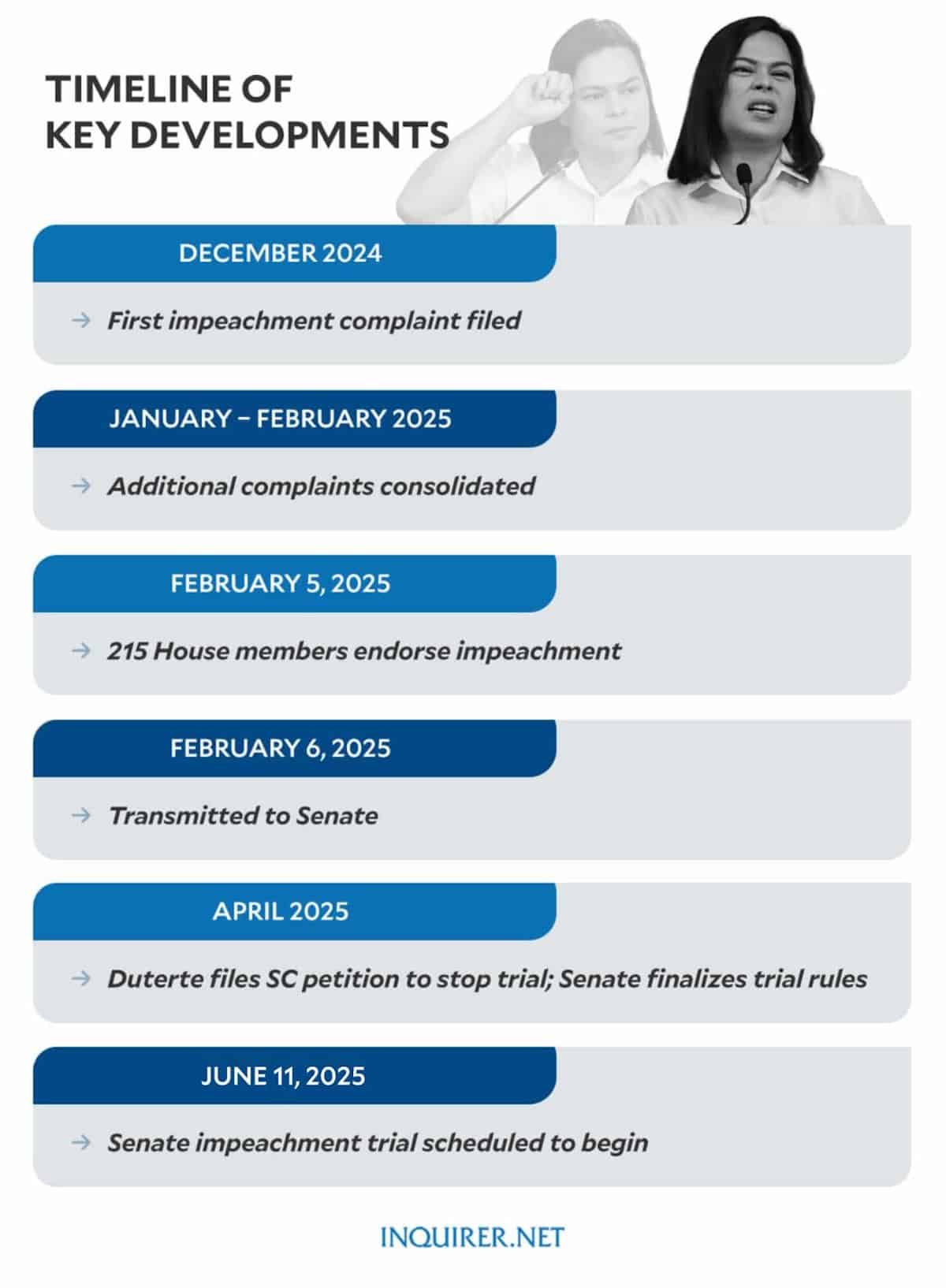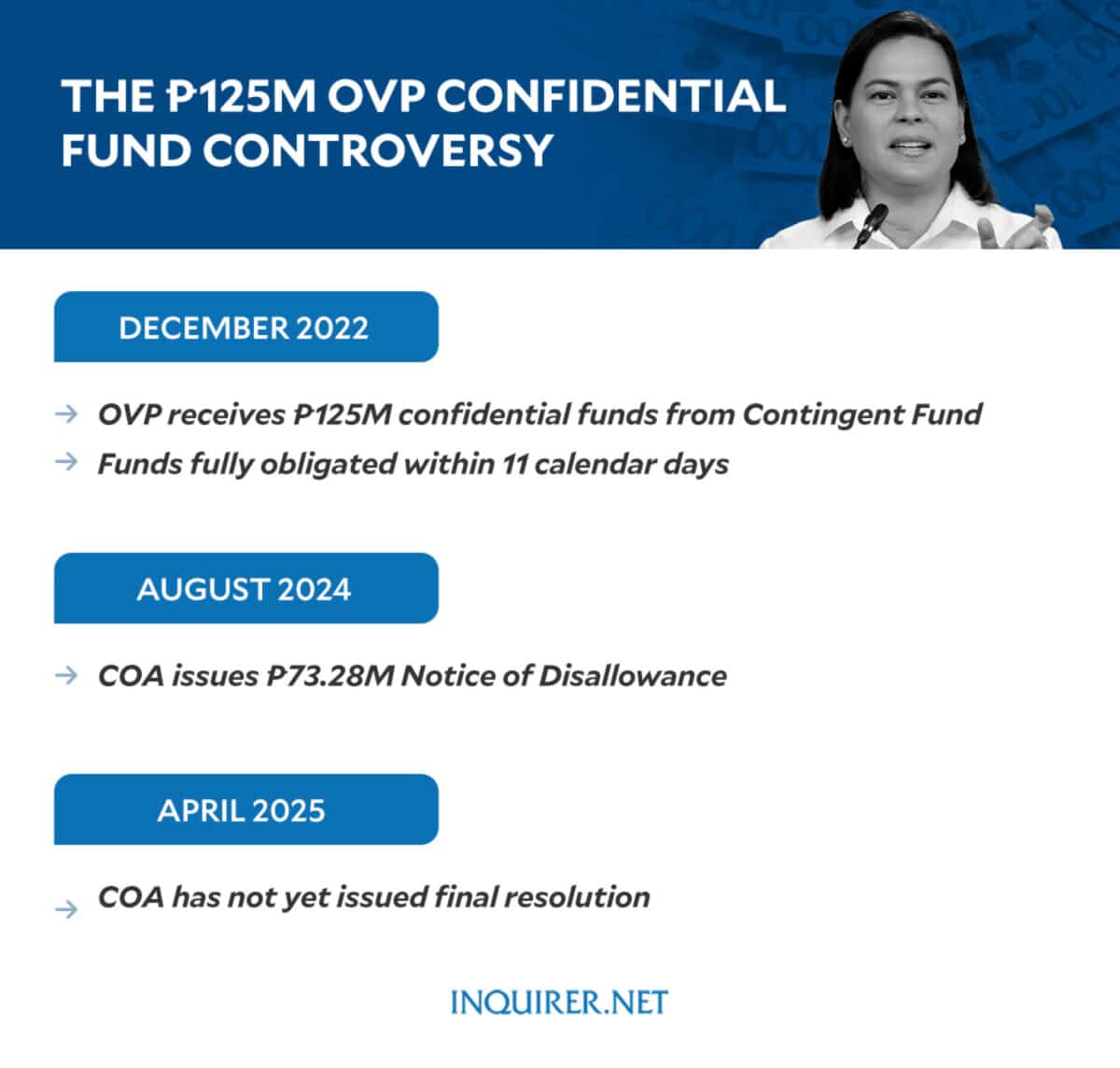MANILA, Philippines—The political crisis gripping Vice President Sara Duterte has entered a decisive and historic phase.
On February 5, the House of Representatives voted overwhelmingly to impeach Duterte, marking the first time a sitting vice president in the post-Edsa People Power era has been driven to the edge of removal.
The move sends shockwaves through the political establishment and signals the unraveling of an alliance that once defined the country’s executive leadership.
Duterte, daughter of former President Rodrigo Duterte, now stands at the center of a high-stakes political and legal battle that could end her vice presidency barely three years into her term.
With accusations ranging from corruption to involvement in a supposed kill plot against President Ferdinand Marcos Jr., her one-time running mate, her impeachment is more than a constitutional exercise—it is a public spectacle with implications for governance, democracy, and the future of political dynasties in the Philippines.
As the Senate prepares to convene as an impeachment court, the nation watches closely. The trial, expected to begin formal hearings in July after a preliminary session in June, will test the strength of institutions and alliances alike. Beyond the legal arguments and political maneuvering, the proceedings may define accountability standards for public officials in an increasingly polarized political landscape.

GRAPHIC: Ed Lustan/INQUIRER.net
Why is Vice President Sara Duterte facing impeachment?
The impeachment complaint accuses Duterte of committing “high crimes,” including corruption and involvement in an alleged assassination plot against President Ferdinand Marcos Jr., her former running mate. The charges stem primarily from her release and spending of P125 million in confidential and intelligence funds (CIFs) within 11 days of assuming office in 2022, which lawmakers say breached fiscal protocols and accountability standards.

Graphics by: Ed Lustan / INQUIRER.net
What are the legal bases for the impeachment complaint?
The charges include betrayal of public trust and culpable violation of the Constitution. Proponents cite Duterte’s alleged failure to follow budget laws, including transparency and procurement rules tied to CIFs. Legal scholars argue that these actions, compounded by politically charged allegations of plotting against the president, justify invoking impeachment under the Constitution’s broad accountability clauses.

Graphics by: Ed Lustan / INQUIRER.net
How strong is the House support for impeachment?
Crossing party lines, 215 members of the House of Representatives supported the fourth impeachment complaint against Duterte — a figure more than double the constitutional threshold. Only one-third, or 102 out of 306 members, are needed to approve the articles of impeachment. The vote was cast on the final session day before Congress adjourned for the May 2025 midterm elections, underscoring the urgency and wide consensus behind the move.
What role did the midterm elections play?
The impeachment trial became a central theme during the campaign, as 12 Senate seats were contested — half of the 24-member chamber that will serve as Duterte’s jury. Political analysts note that the election results slightly favored Duterte, with one of her allies winning an unexpected seat while President Marcos’ slate fell short of expectations. In the House of Representatives, of the 115 lawmakers who initially signed the impeachment complaint and sought reelection, 100—or 86.9 percent—won their races, according to Assistant Majority Leader and Tingog party-list Rep. Jude Acidre. The high reelection rate, he noted, affirmed public support for their stance and further legitimized the push for accountability.

Graphics by: Samuel Yap / INQUIRER.net
How many votes are needed to convict or acquit Duterte?
Under the Constitution, conviction requires a two-thirds majority in the 24-member Senate — 16 votes. Conversely, Duterte needs at least nine votes to be acquitted and remain in office. A conviction would mean her immediate removal from the vice presidency and a permanent ban from holding public office.
Who will succeed Vice President Duterte if she is removed from office?
The president will nominate the next vice president from among members of Congress — either the Senate or the House of Representatives. This process is grounded in Section 9, Article VII of the 1987 Constitution, which provides that in the event of a vacancy in the Office of the Vice President, the president shall nominate a replacement subject to confirmation by a majority vote of both houses of Congress voting separately. All sitting senators meet the constitutional requirements to be nominated, including the minimum age of 40. However, some members of the House are under 40 and thus ineligible under Article VII, Section 2, which sets the qualifications for the office.
What has Vice President Duterte said about the impeachment?
Duterte has labeled the impeachment as politically driven. In a controversial remark, she declared she “wants a bloodbath” during the trial — language that drew sharp criticism. She has not directly addressed the allegations but insists that all expenditures were lawful and essential for national security.
What is President Marcos’ stance?
President Marcos, whose alliance with Duterte unraveled soon after their 2022 electoral victory, has distanced himself from the proceedings. While denying any hand in the impeachment, he said in a podcast interview after the elections, “Let’s leave that to the Senate, which has its own processes.” Marcos has expressed willingness to reconcile with the Duterte clan, but tensions have escalated since the impeachment and the arrest of former President Rodrigo Duterte, who now faces trial at the International Criminal Court over his bloody drug war.
When did the Senate convene as an impeachment court?
The Senate officially convened as an impeachment court on June 10, 2025, with 22 senators taking their oath as judges. Senate President Francis “Chiz” Escudero is serving as the presiding officer. He took his oath a day earlier, on June 9, and led the oath-taking ceremony, marking the Senate’s formal assumption of its constitutional duty to try the impeachment complaint transmitted by the House of Representatives.
What was the first action taken by the Senate impeachment court?
The Senate, sitting as an impeachment court, voted 18-5 with no abstentions on June 10 to return the articles of impeachment against Duterte to the House of Representatives. But according to the motion filed by Sen. Alan Peter Cayetano, the return of the articles does not constitute a dismissal or termination of the case.
Who voted against the motion?
The five senators who voted against the motion were:
- Koko Pimentel
- Risa Hontiveros
- Nancy Binay
- Grace Poe
- Sherwin Gatchalian
Who voted in favor of the motion?
The 18 senators who voted in favor of returning the articles were:
- Alan Peter Cayetano
- Ronald “Bato” dela Rosa
- Bong Revilla
- Imee Marcos
- JV Ejercito
- Bong Go
- Loren Legarda
- Robinhood Padilla
- Jinggoy Estrada
- Francis Tolentino
- Joel Villanueva
- Pia Cayetano
- Lito Lapid
- Cynthia Villar
- Mark Villar
- Juan Miguel Zubiri
- Raffy Tulfo
- Chiz Escudero
Reports from Cristina Baclig, Kurt dela Peña, Gabriel Pabico Lalu, Zacarian Sarao, Luisa Cabato, and Charie Abarca of INQUIRER.net

